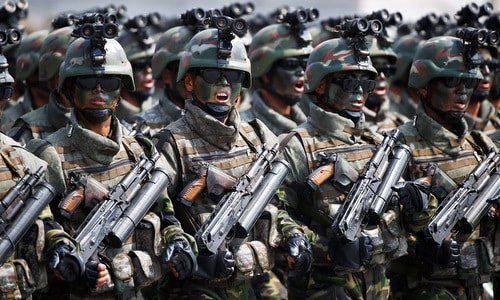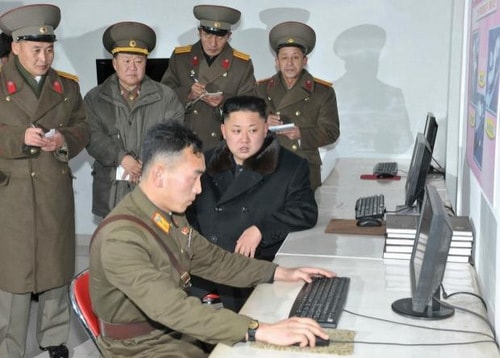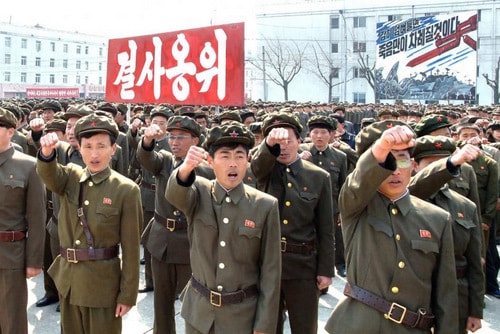What factors can help North Korea confront the US-South Korea coalition?
Military expert Franz-Stefan Gady said that asymmetric warfare capabilities and fighting spirit are two important factors that help North Korea confront the US and South Korean militaries.
 |
Special forces are one of North Korea's main forces. Photo: Reuters. |
Most military analysts believe that a second Korean War is unlikely, but if it breaks out, it will be an extremely fierce conflict, ending with North Korea's quick defeat by the US-South Korean coalition.
However, military expert Franz-Stefan Gady said that the above assessments are only based on the correlation of pure military power, not taking into account asymmetric warfare capabilities and fighting spirit, two powerful weapons that help Pyongyang deal with opponents that are stronger in terms of equipment, according to Diplomat.
Asymmetric warfare capabilities
To compensate for its disadvantages in equipment compared to the US and South Korea, North Korea's military strategy focuses on guerrilla warfare, hybrid operations and blitzkrieg tactics. Since North Korean leader Kim Jong-un came to power, the country's military has increasingly focused on total war based on asymmetric warfare capabilities, including the deployment of weapons of mass destruction (WMD).
North Korea would find it difficult to stop a US-South Korea joint attack with conventional weapons, so it would likely use biochemical and nuclear weapons for defense.
"Realizing the significant superiority of the US military, since the early 1980s, North Korea began to adjust its military strategy, combining WMD with artillery, ballistic missiles and special forces," said Mr. Bruce W. Bennett, a defense expert at the RAND Institute.
Another worrying capability of North Korea is cyber warfare. According to South Korean military intelligence, North Korea has established 6,800 specialized cyber warfare units, capable of carrying out numerous attacks on enemy information technology networks.
"We must prepare for sudden cyber attacks from North Korea, especially targeting South Korea's key civilian infrastructure such as nuclear power plants," warned Professor Greg Austin of the Cyber Security Centre at the University of New South Wales.
Pyongyang has many ways to restrain Washington and Seoul's war-fighting capabilities, such as cutting off transportation networks, especially airports and ships used to move forces to the region.
North Korea could also attack South Korea’s traffic signal network and other infrastructure, causing panic and delaying evacuations and limiting the ability of the US to move troops. However, Pyongyang is currently not believed to have the ability to disable or penetrate Washington’s nuclear command and control system.
 |
North Korea possesses formidable cyber warfare capabilities. Photo: KCNA. |
Special forces could also be a card for North Korea to prevent the US-South Korea coalition. Pyongyang currently has about 200,000 special forces organized into many units such as light infantry divisions, amphibious assault forces and sniper brigades.
In wartime, these so-called "iron fist" forces would infiltrate South Korea through tunnels or land from submarines, hovercraft, An-2 transport aircraft and helicopters. North Korean special forces could conduct hybrid warfare against enemy units, bases, key facilities and high-ranking officials.
North Korea's active military force of more than one million men, spread across many branches, is also a force not to be underestimated in war. 70% of North Korea's infantry is stationed near the demilitarized zone (DMZ), not to mention the air force and navy.
South Korean intelligence believes that North Korea's conventional warfare capabilities have improved, including integrating a tactical command and control system to improve C4I (command, control, communications, computer applications and intelligence) capabilities.
Pyongyang has recently deployed 300mm multiple rocket launchers near the border, allowing it to strike at any time. North Korea's conventional arsenal can sustain an all-out war for three months without replenishment.
Fighting spirit
In addition to the asymmetrical combat capability, the fighting spirit of North Korean soldiers is a factor that cannot be underestimated. The US and South Korean air forces can eliminate a large number of targets in North Korea, but they still need to deploy infantry to ensure the complete eradication of enemy positions.
"There are about 7,000 artillery batteries with a range of Seoul that are well protected. It would take the US and South Korean air force and artillery at least two weeks to neutralize them, but they cannot be guaranteed to be as effective as planned," said Colonel James Crighton, former chief of staff of the US Eighth Army in Korea.
Success in any war depends largely on the fighting spirit of the parties. It is likely that the US and South Korean infantry will encounter an opponent with significant physical loss but still formidable morale, not to mention the terrain of North Korea is very favorable for defense.
 |
Fighting spirit is an indispensable element of North Korean soldiers. Photo: IBTimes. |
North Korea is a military-centric country, and there is no sign that its soldiers will lose morale when facing the US-South Korea coalition. The North Korean public now seems ready for war, believing they can win.
In the event of an attack by the US and South Korea across the 38th parallel, North Korean soldiers would have more motivation to fight to protect their country, even against an opponent with complete superiority.
In fact, during the Korean War of 1950-1953,American forces commanded by General Douglas McArthurThe North Koreans, who had clear military superiority and well-trained troops, were forced to retreat before the advance of the North Koreans, who had no air support whatsoever during 1950-1951.
War is unpredictable and it is difficult to say that the US will win easily. Therefore, Washington needs to carefully consider Pyongyang's military capabilities and fighting spirit before considering any option of using force to resolve the crisis on the Korean peninsula, expert Gady said.
According to VNE
| RELATED NEWS |
|---|
